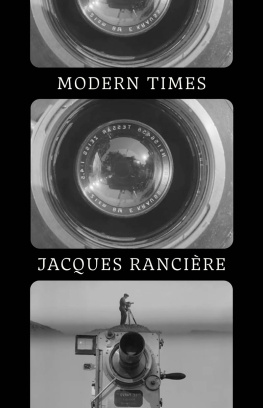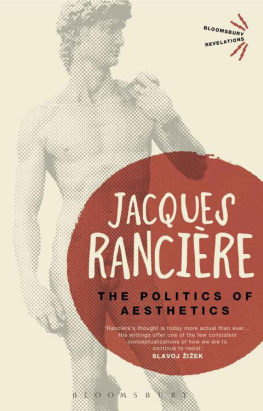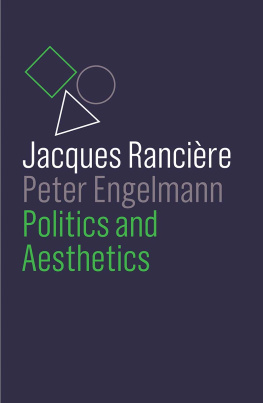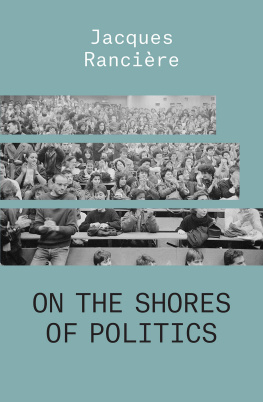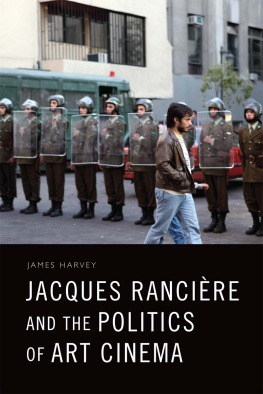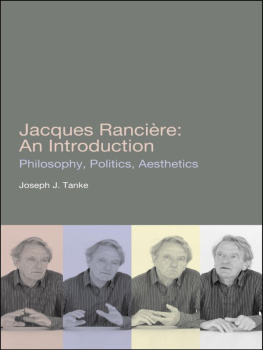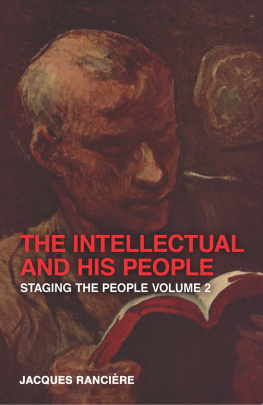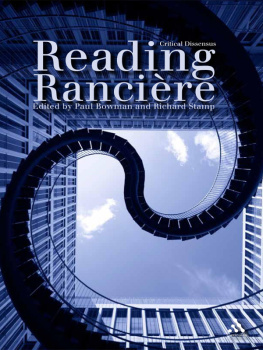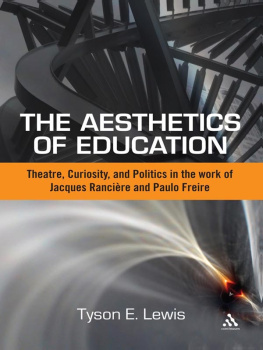Jacques Ranciere - The Emancipated Spectator
Here you can read online Jacques Ranciere - The Emancipated Spectator full text of the book (entire story) in english for free. Download pdf and epub, get meaning, cover and reviews about this ebook. year: 2014, publisher: Verso, genre: Religion. Description of the work, (preface) as well as reviews are available. Best literature library LitArk.com created for fans of good reading and offers a wide selection of genres:
Romance novel
Science fiction
Adventure
Detective
Science
History
Home and family
Prose
Art
Politics
Computer
Non-fiction
Religion
Business
Children
Humor
Choose a favorite category and find really read worthwhile books. Enjoy immersion in the world of imagination, feel the emotions of the characters or learn something new for yourself, make an fascinating discovery.

- Book:The Emancipated Spectator
- Author:
- Publisher:Verso
- Genre:
- Year:2014
- Rating:3 / 5
- Favourites:Add to favourites
- Your mark:
- 60
- 1
- 2
- 3
- 4
- 5
The Emancipated Spectator: summary, description and annotation
We offer to read an annotation, description, summary or preface (depends on what the author of the book "The Emancipated Spectator" wrote himself). If you haven't found the necessary information about the book — write in the comments, we will try to find it.
The Emancipated Spectator — read online for free the complete book (whole text) full work
Below is the text of the book, divided by pages. System saving the place of the last page read, allows you to conveniently read the book "The Emancipated Spectator" online for free, without having to search again every time where you left off. Put a bookmark, and you can go to the page where you finished reading at any time.
Font size:
Interval:
Bookmark:
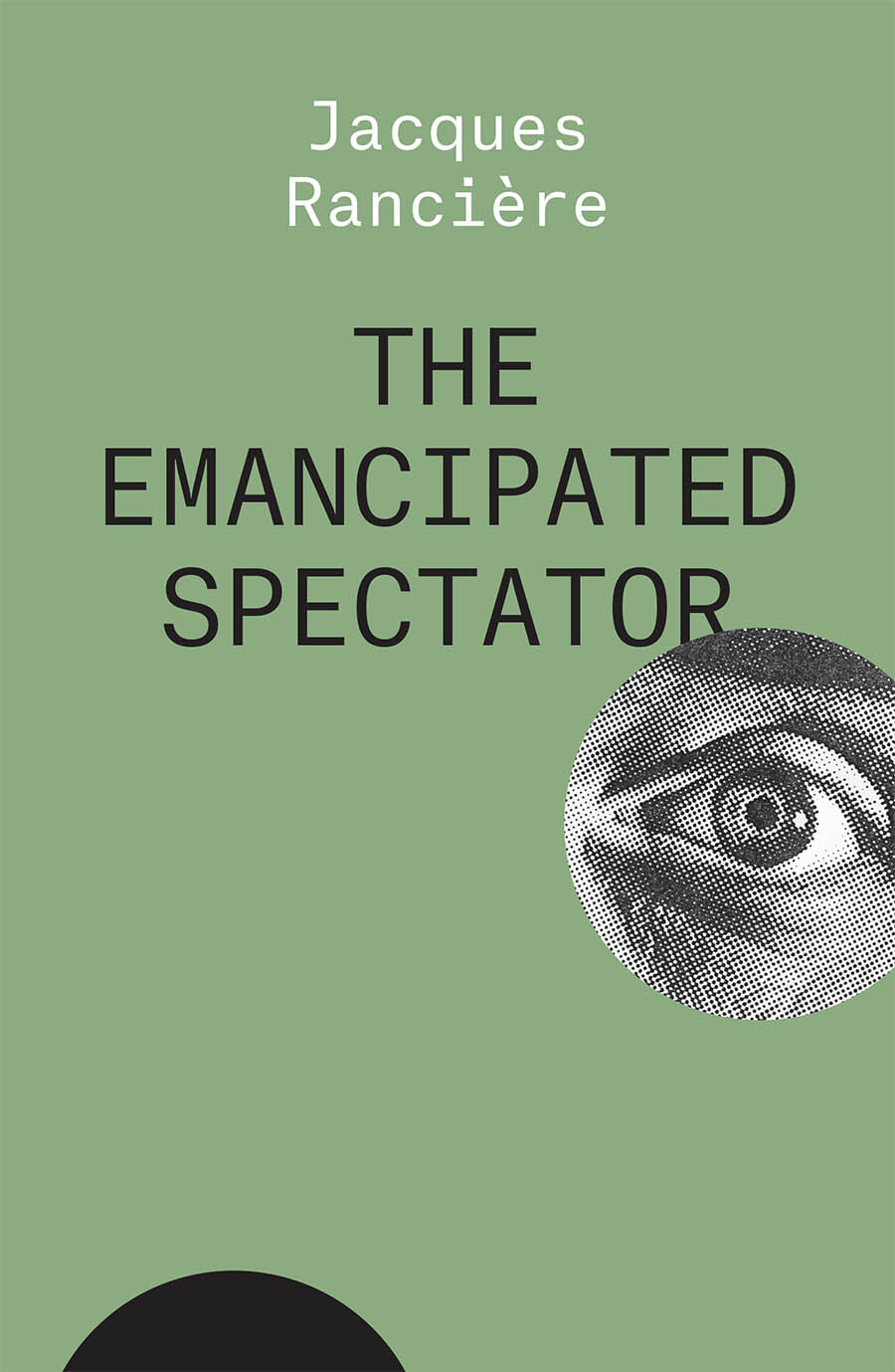
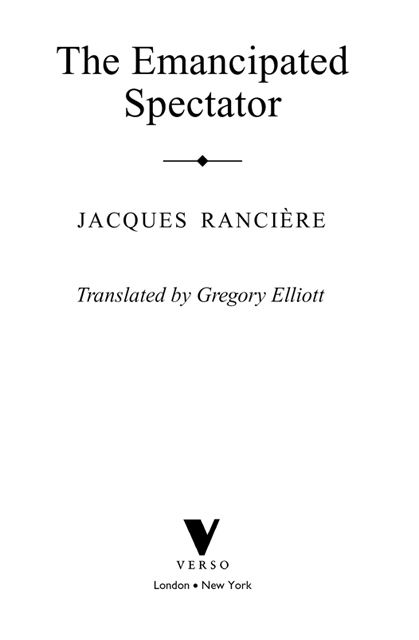
First English edition published by Verso 2009
This edition published by Verso 2021
Copyright Verso 2009, 2021
Translation Gregory Elliott 2009, 2021
First published as Le spectateur mancip
@ Editions La Fabrique 2008
All rights reserved
The moral rights of the author have been asserted
Verso
UK: 6 Meard Street, London W1F 0EG
US: 20 Jay Street, Suite 1010, Brooklyn, NY 11201
www.versobooks.com
Verso is the imprint of New Left Books
ISBN-13: 978-1-78873-964-1
ISBN-13: 978-1-78168-958-5 (UK EBK)
ISBN-13: 978-1-84467-832-7 (US EBK)
British Library Cataloguing in Publication Data
A catalogue record for this book is available from the British Library
Library of Congress Cataloging-in-Publication Data
A catalog record for this book is available from the Library of Congress
This book originated in a request I received a few years ago to introduce the reflections of an academy of artists on the spectator, on the basis of ideas developed in my book The Ignorant Schoolmaster . The proposal initially caused me some bewilderment. The Ignorant Schoolmaster set out the eccentric theory and singular fate of Joseph Jacotot, who created a scandal in the early nineteenth century by claiming that one ignoramus could teach another what he himself did not know, asserting the equality of intelligence and opposing intellectual emancipation to popular instruction. His ideas had fallen into oblivion in the middle of his century. I had thought it worthwhile reviving them in the 1980s, to inject some life into debates on the purposes of public education by throwing in the issue of intellectual equality. But how was the thought of a man whose artistic universe can be emblematized by the names of Demosthenes, Racine and Poussin relevant to contemporary thinking about art?
On reflection, it seemed to me that the absence of any obvious relationship between the theory of intellectual emancipation and the question of the spectator today was also an opportunity. It might afford an occasion for a radical differentiation from the theoretical and political presuppositions which, even in postmodern form, still underpin the gist of the debate on theatre, performance and the spectator. But in order to bring out the relationship and make it meaningful, it was necessary to reconstruct the network of presuppositions that place the question of the spectator at the heart of the discussion of the relations between art and politics. It was necessary to outline the general model of rationality against whose background we have become used to judging the political implications of theatrical spectacle. I use this term here to include all those forms of spectacle drama, dance, performance art, mime and so on that place bodies in action before an assembled audience.
The numerous critiques for which theatre has provided the material throughout its history can in effect be boiled down to one basic formula. I shall call it the paradox of the spectator a paradox that is possibly more fundamental than the famous paradox of the actor. This paradox is easily formulated: there is no theatre without a spectator (if only a single, concealed spectator, as in the fictional performance of Le Fils naturel that gives rise to Diderots Entretiens ). But according to the accusers, being a spectator is a bad thing for two reasons. First, viewing is the opposite of knowing: the spectator is held before an appearance in a state of ignorance about the process of production of this appearance and about the reality it conceals. Second, it is the opposite of acting: the spectator remains immobile in her seat, passive. To be a spectator is to be separated from both the capacity to know and the power to act.
This diagnosis leads to two different conclusions. The first is that theatre is an absolutely bad thing: a scene of illusion and passivity that must be abolished in favour of what it prohibits knowledge and action; the action of knowing and action guided by knowledge. This is the conclusion formulated by Plato: theatre is the place where ignoramuses are invited to see people suffering. What the theatrical scene offers them is the spectacle of a pathos , the manifestation of an illness, that of desire and suffering that is to say, the self-division which derives from ignorance. The particular effect of theatre is to transmit this illness by means of another one: the illness of the gaze in thrall to shades. It transmits the illness of ignorance that makes the characters suffer through a machinery of ignorance, the optical machinery that prepares the gaze for illusion and passivity. A true community is therefore one that does not tolerate theatrical mediation; one in which the measure that governs the community is directly incorporated into the living attitudes of its members.
That is the most logical deduction. But it is not the one that has prevailed among critics of theatrical mimesis. They have invariably retained the premises while changing the conclusion. According to them, whoever says theatre says spectator and therein lies the evil. Such is the circle of theatre as we know it, as our society has shaped it in its image. We therefore need a different theatre, a theatre without spectators: not a theatre played out in front of empty seats, but a theatre where the passive optical relationship implied by the very term is subjected to a different relationship that implied by another word, one which refers to what is produced on the stage: drama . Drama means action. Theatre is the place where an action is taken to its conclusion by bodies in motion in front of living bodies that are to be mobilized. The latter might have relinquished their power. But this power is revived, reactivated in the performance of the former, in the intelligence which constructs that performance, in the energy it generates. It is on the basis of this active power that a new theatre must be built, or rather a theatre restored to its original virtue, to its true essence, of which the spectacles that take this name offer nothing but a degraded version. What is required is a theatre without spectators, where those in attendance learn from as opposed to being seduced by images; where they become active participants as opposed to passive voyeurs.
There have been two main formulations of this switch, which in principle are conflicting, even if the practice and the theory of a reformed theatre have often combined them. According to the first, the spectator must be roused from the stupefaction of spectators enthralled by appearances and won over by the empathy that makes them identify with the characters on the stage. He will be shown a strange, unusual spectacle, a mystery whose meaning he must seek out. He will thus be compelled to exchange the position of passive spectator for that of scientific investigator or experimenter, who observes phenomena and searches for their causes. Alternatively, he will be offered an exemplary dilemma, similar to those facing human beings engaged in decisions about how to act. In this way, he will be led to hone his own sense of the evaluation of reasons, of their discussion and of the choice that arrives at a decision.
According to the second formulation, it is this reasoning distance that must itself be abolished. The spectator must be removed from the position of observer calmly examining the spectacle offered to her. She must be dispossessed of this illusory mastery, drawn into the magic circle of theatrical action where she will exchange the privilege of rational observer for that of the being in possession of all her vital energies.
Font size:
Interval:
Bookmark:
Similar books «The Emancipated Spectator»
Look at similar books to The Emancipated Spectator. We have selected literature similar in name and meaning in the hope of providing readers with more options to find new, interesting, not yet read works.
Discussion, reviews of the book The Emancipated Spectator and just readers' own opinions. Leave your comments, write what you think about the work, its meaning or the main characters. Specify what exactly you liked and what you didn't like, and why you think so.

